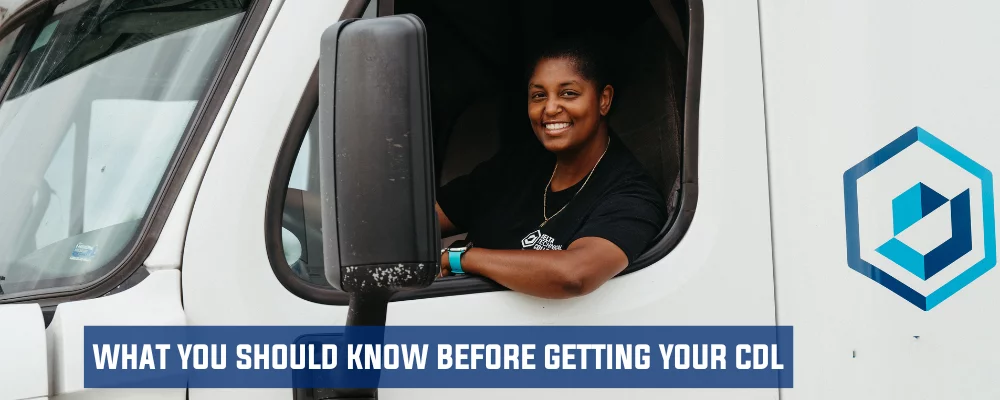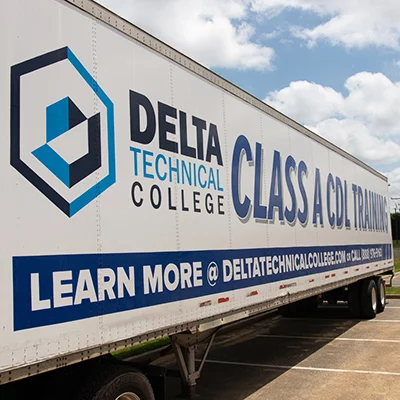Are you interested in starting a career as a truck driver? A truck driver training course focused on helping you pass your state licensing exam and obtain a Class A commercial driver’s license (CDL) might be your best first step.
Truck driver training doesn’t have to be time intensive to prepare you for licensure and an entry-level truck driving career. For example, the Delta Technical College (Delta Tech) CDL Training Course lasts just 20 days. With daytime and evening classes offered, the Delta Tech CDL Training Course provides hands-on experience and teaches classroom theory to prepare students to pass their state licensing exams and obtain CDL licenses. The Delta Tech CDL Training Course includes 40 classroom training hours, 16 range hours, 16 over-the-road hours, 28 observation hours, and 60 remedial hours.
Types of Truck Driver Licenses
There are three different classes of CDL licenses. Each license allows drivers to operate a coordinated class of vehicles.
- Class A: Class A vehicles include any combination of vehicles with a gross combined weight of 26,001 pounds or more, inclusive of up to 10,000 pounds of towed weight.
- Class B: Any single vehicle with a gross vehicle weight of 26,001 pounds or more is classified as Class B. Class B also includes a Class B vehicle towing up to 10,000 pounds.
- Class C: Any vehicle that is designed to transport 16 or more passengers (including the driver) but does not meet the Class A or Class B descriptions falls into the Class C category. Class C also includes vehicles designated to transport hazardous materials.
The Delta Tech CDL Training Course and Professional Truck Driving Program are both designed to prepare students for CDL Class A licensure procedures.Certain types of vehicles, such as double and triple trailers, passenger vehicles, tank vehicles, hazmat vehicles and school buses, require endorsements to drive. Additional knowledge and skills tests may be required to obtain these endorsements.
Factors that Impact the Amount of Time It Takes to Acquire a CDL License
As previously noted, CDL training or professional truck driving education is recommended as a first step toward obtaining a CDL license. But there are additional steps that may impact the amount of time it takes to get started as a professional truck driver:
- CDL learner’s permit: In the state of Mississippi, before you can take your CDL driving test, you must have a valid Mississippi driver’s license and a valid Mississippi CDL learner’s permit for the matching class type.
- State-required driving miles: Once you have a CDL learner’s permit (or commercial learner’s permit, as it’s called in other states), you may be required to accrue behind-the-wheel driving hours before you can take the CDL test.
- Getting endorsements for specific vehicle types: Endorsements allow you to drive specific vehicle types, including school buses and trucks designed to transport hazardous materials. The broader you want your skillset and licenses to be, the more endorsements you will need. Click here to find out more about applying for a CDL and endorsements in the state of Mississippi.
Interested in Learning More About Truck Driving?
Fill out the form below to receive info about our career training programs.
What to Expect After You Get Your CDL
Assuming you successfully complete CDL training or a professional truck driving program and acquire a CDL license, here’s what you can look forward to in the trucking industry:
- Competitive salaries: The median annual wage for heavy and tractor-trailer truck drivers was $47,130 as of May 2020. Although it’s important to note that wages vary by region and a variety of other factors, the median wage for heavy and tractor-trailer truck drivers was higher than the average for all occupations in the U.S., according to data from the Bureau of Labor Statistics.
- Industry growth expected: With economic growth reliant on the transportation of materials, from 2019 to 2029, the Bureau of Labor Statistics predicts 2% growth in the employment of heavy and tractor-trailer drivers.
- Freedom from the 9-to-5 lifestyle: Truck driving schedules vary as widely as their routes. While traditional hours are available, many truck drivers enjoy the flexibility of work schedules that can adjust with their lives.
- A chance to see the country: Although local routes are common, many long-haul truck drivers enjoy the opportunity to see the country while driving on the open road. Some shipping routes even include international travel into Canada or Mexico.
Does a truck driving career sound exciting to you? Training for the CDL test is your first step. Contact the Delta Tech Admissions Team to learn more about our truck driver training options.
SOURCES
https://www.dmv.org/commercial-drivers/cdl-class-types.php
https://www.fmcsa.dot.gov/registration/commercial-drivers-license/drivers
https://www.bls.gov/ooh/transportation-and-material-moving/heavy-and-tractor-trailer-truck-drivers.htm#tab-4
https://www.bls.gov/ooh/transportation-and-material-moving/heavy-and-tractor-trailer-truck-drivers.htm#tab-6
https://www.dps.state.ms.us/new-drivers-license/commercial-operator-license-classes-a-b-c-d/



